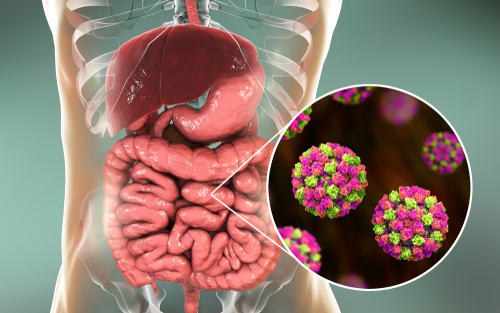Health agencies across India are on alert after at least 13 confirmed cases of Norovirus have been recorded in Kerala’s Wayanad district. The disease was first reported in some students of a veterinary college in Pookode two weeks ago.
Here’s a look at what the virus is, how it spreads, its symptoms and what can be done to protect yourself.
What is Norovirus
According to America’s Centers for Disease Control and Prevention (CDC), Norovirus is a contagious virus that is “the most common cause of acute gastroenteritis in the world, annually causing an estimated 685 million cases.”
It is usually more common in cooler winter months, with most outbreaks occurring from November to April. Hence, it is sometimes referred to as the ‘winter vomiting bug’.
Symptoms
The most common symptoms are sudden onset of severe diarrhoea, vomiting, nausea and stomach cramps. Some people may also suffer from fever, headaches and body aches. These symptoms usually start 12 to 48 hours after being infected by Norovirus and typically last about one to three days.
How It Spreads

Like every virus, Norovirus needs a host to survive for an extended period. It, therefore, spreads from person to person and is highly contagious. It can be transmitted via direct contact with an infected person, contact with a contaminated surface, and consuming contaminated food or water.
According to the Mayo Clinic, Norovirus transmissions occur most frequently in crowded places such as hospitals, schools, colleges, restaurants and cruise ships. As a result, Norovirus is often referred to as the ‘cruise ship virus’ because of how quickly it spreads in close quarters.
Diagnosis
Examination of stool samples is the preferred method to diagnose Norovirus, although other tests are also available. Diagnosis can also be made based on symptoms alone.
Treatment
Most people infected by Norovirus recover at home itself with sufficient rest and intake of fluids to prevent dehydration. That said, the virus can be fatal — it causes severe malnutrition and dehydration if it lingers in your body for too long. As such, patients with severe symptoms may have to be treated in a hospital with fluids. Unfortunately, there is no specific medicine for the illness.
So if you have a weakened immune system or are pregnant and suspect you may be infected, visit a doctor.
Prevention
The best way to prevent Norovirus spread is by maintaining good personal hygiene and keeping a clean surrounding. Disinfect surfaces often, especially when someone in the neighbourhood has developed symptoms. Also, avoid stale food, food exposed to open air or food cooked by someone who may be sick.
As per the guidelines issued by Health Ministry,
“Wash your hands thoroughly with soap and water before eating and after using the toilet. Those who interact with animals should pay special attention. Chlorinate drinking water sources, wells and storage tanks with bleaching powder. Use chlorinated water for domestic use. Use only boiled water for drinking. Fruits and vegetables should only be used after they have been thoroughly washed. Sea fish and shellfish such as crab and mussels must only be consumed after being well cooked.”
If you or someone in your household has been infected by Norovirus, ensure minimal contact with other members. Also, wash their clothes and other contaminated items with hot water and detergent.
If you are suffering from similar symptoms, wait at least two days after recovering before preparing meals or taking care of others. It is important to note that there are several types of Norovirus, so having the disease does not protect one from being infected again.
(Edited by Vinayak Hegde)
No comments:
Post a Comment